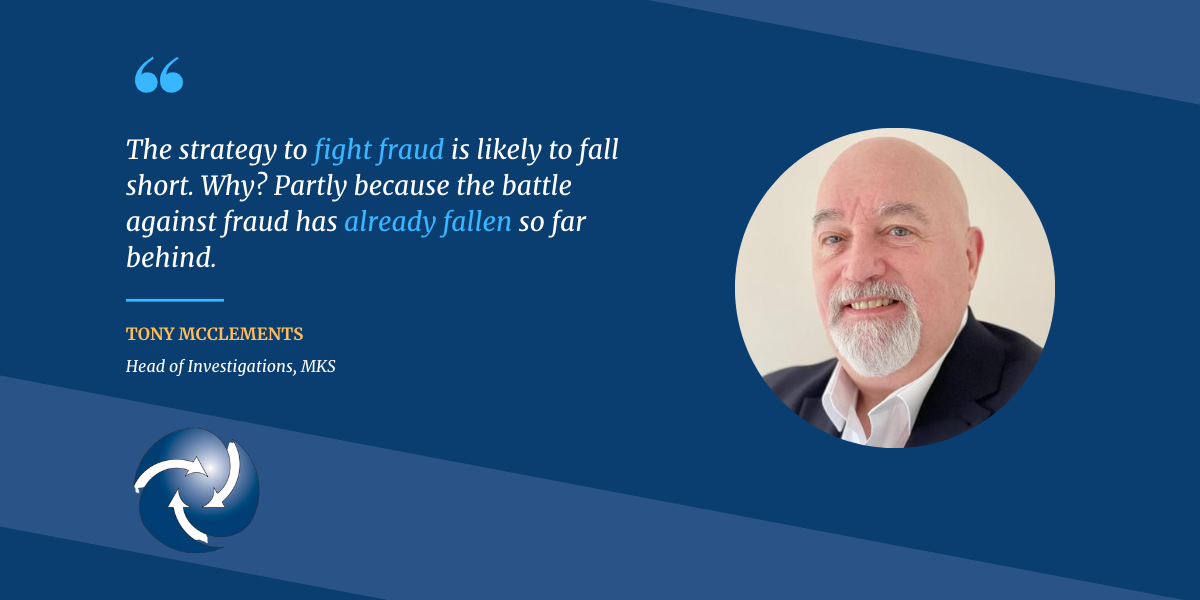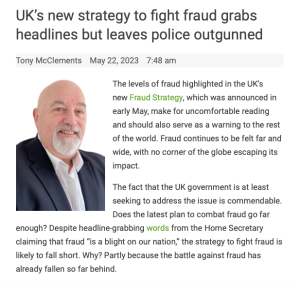Head of Investigations Tony McClements asks if the UK’s new national Fraud Strategy is up to the task
The levels of fraud highlighted in the UK’s new Fraud Strategy, which was announced in early May, make for uncomfortable reading and should also serve as a warning to the rest of the world. Fraud continues to be felt far and wide, with no corner of the globe escaping its impact.
The fact that the UK government is at least seeking to address the issue is commendable. Does the latest plan to combat fraud go far enough? Despite headline-grabbing words from the Home Secretary claiming that fraud “is a blight on our nation,” the strategy to fight fraud is likely to fall short. Why? Partly because the battle against fraud has already fallen so far behind.
Fraud now accounts for 41 percent of all crime in the UK. Of that, less than 1 percent receives any policing resources and attention.
Losses attributed to fraud may be as high as £190 billion, according to one figure quoted by the UK’s National Crime Agency. Given that fraud is notoriously underreported, the true figure is likely to be much greater.
The Fraud Strategy calls for clamping down on cold calls and text messages, adding 400 investigators, and tasking intelligence agencies to hunt down overseas criminal networks of scammers. Those are positive steps. But considering the magnitude of the problem that already exists, they aren’t likely to have much impact.
Another reason the strategy faces long odds is because fraud is underreported and, therefore, difficult to tackle. Why is it underreported?
First, the public (in the UK and other countries) has often given up hope of the police investigating on their behalf. Too often, the police view fraud as a civil offense, as a non-violent offense with low priority, or perhaps even as a victimless crime, even if that makes little logical sense.
Second, many (or maybe most) victims decide not to report fraud out of personal embarrassment — feeling shame in admitting they fell for a scam that, in hindsight, should have been easy to avoid.
Finally, enforcement agencies may not tabulate fraud consistently because they do not plan to respond to complaints about it.
All these factors combine to render reported fraud statistics unreliable.
In the UK, hard-pressed police, still suffering the consequences of austerity cuts inflicted on them over a decade ago (which slashed 20,000 officers from UK forces, a number only now being replenished), find themselves overwhelmed. In the past, the government was also accused of failing to count staggeringly high fraud numbers among supposed “falling” crime figures – leading to a rebuke from the UK’s statistics authority.
Meanwhile, the proposed budget to implement the Fraud Strategy is underwhelming when set against the scale of losses to fraud in the UK. The amounts include £100 million ($125 million) of immediate funding to police forces to combat fraud, along with a further £300 million ($375 million) “wider investment” for tackling the broader category of economic crime.
To put the new fraud announcement into some context, there are 45 police forces in the UK, excluding specialist outfits such as the National Crime Agency. If the £100 million proposed in the new strategy is spread across these forces, some of the smaller forces will likely see less than a £1 million ($1.25 million) increase in their budget, an amount likely to have minimal impact upon any police force’s ability to investigate and prosecute fraud, and certainly not enough for these forces to consider reassembling their now defunct fraud squads.
The Fraud Strategy overall contains some good ideas and objectives. But if you have a long-running epidemic of a particular crime, major challenges must be met with dramatic action. Lesser efforts, spread across regional forces, are likely to achieve little.


